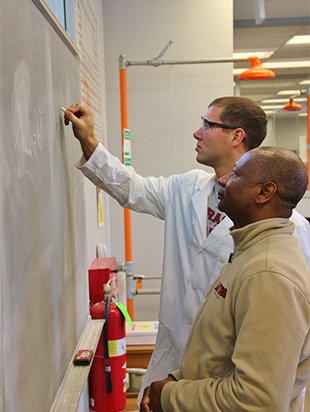Growing up in Ghana, Dr. Moses Dogbevia, Associate Professor of Chemistry, learned to live and work with people of different ethnic and racial backgrounds, ideologies and cultural values.

“My cultural history taught me to value human relationships and to understand that we are all the same many ways,” said the professor, now in his eighth year at Hastings College. “I strive to look out for my neighbors, live in peace and unity with all, and work to build a community that is friendly to all and safe, where everyone feels they belong.”
Traditional chemistry courses and labs don’t always afford opportunities for Dr. Dogbevia – pronounced “dog-BEHV-ee-uh” — to share these lessons. However, the cultural experience course he has taught for several J-Terms does.
Dogbevia describes the course, which includes a trip to Ghana, as a form of experiential learning.
“It is one thing to teach a student the principles of how to engage cultural diversity in a community, but it is different to get the students to practice what they learned,” he explained. “How to live with people in communal labor and get along with people who are different from you in terms of cultural practices and traditions is what my J-term course taught the participants.
“My hope is that the students who participate in the class will learn from the experiences on the trip and begin to live exemplary lives here on campus. That will go a long way to impact the lives of others in the community and lead to the creation of an atmosphere where everyone in the community will feel valued and live at peace with everyone.”
During the three week trip to Western Africa, four students stayed with host families. This pushed them to consider how others live their daily lives. The trip was structured so students met members of Ghana’s various ethnic groups and explored various sectors of Ghanaian society including education, culture and traditions, politics and governance, and health care.
“[T]he students wished they could have the chance to live in Ghana longer than the trip could afford them. Most of the participants hoped to return to Ghana or Africa to identify more with the rich culture and traditions of the people,” Dr. Dogbevia said.
About Dogbevia
Dogbevia’s path to the classroom began early.
“In Ghana, the curriculum is structured such that, in high school you have to declare your field of study and take elective classes in your declared field,” he said.
Dogbevia earned his undergraduate degree in physics with a diploma in science education. For nine years, he taught high school physics before coming to the U.S. to earn his Ph.D. in chemical physics from the University of Nevada-Reno. The degree allows him to teach in physics or chemistry.
He acknowledges that some people find it unusual for a professor in the sciences to teach a course like his J-Term offering.
“However, we should not lose sight of the fact that cultural diversity cut across all disciplines, and we need to engage practices that will make the students we teach from all walks of life to feel valued in our classes and be impacted by our ways of teaching in a way that will manifest in their future lives,” said Dogbevia.
“My passion is to contribute my effort to make a community more friendly environment where everyone feels they have a role to play to engage in the dynamics of social life and look out for their neighbor’s welfare for a common good.
“At Hastings College, we haven’t gotten there yet and my class is a means to help make a difference in cultural diversity on campus.”

